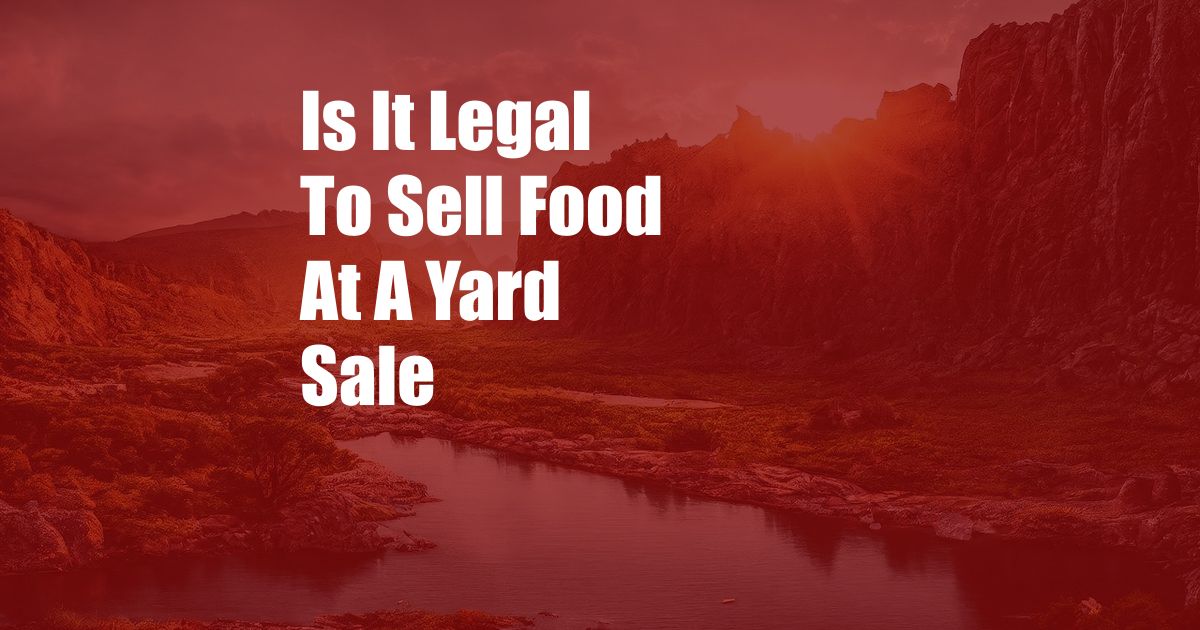
Is It Legal to Sell Food at a Yard Sale?
Have you ever wondered if you could supplement your yard sale earnings by selling homemade goodies or leftover party platters? The answer to that question may depend on where you live and what type of food you’re selling. Let’s dive into the legal considerations of selling food at yard sales.
Food Safety Regulations and Licensing
To ensure public health, many cities and counties have regulations governing the sale of food at yard sales. These regulations may require you to obtain a temporary food permit or license, undergo food safety training, and follow specific guidelines for handling and storing food. Failure to comply with these regulations can result in fines or even criminal charges.
Types of Food That Can Be Sold
The types of food you can sell at a yard sale will vary depending on the local regulations. Generally, non-perishable items such as baked goods, candy, and canned goods are allowed. Some jurisdictions may also permit the sale of homemade jams and jellies, as long as they are properly labeled and packaged. However, selling potentially hazardous foods like meat, dairy products, or uncooked fruits and vegetables is usually prohibited due to food safety concerns.
Liability Considerations
Selling food at a yard sale comes with inherent liability risks. If someone becomes sick after consuming food you have sold, you could be held legally responsible. It’s essential to take all necessary precautions to ensure the safety of your food, such as:
- Properly storing and handling food to prevent spoilage
- Using clean utensils and equipment
- Labeling food with ingredients and any potential allergens
- Maintaining good hygiene practices
Tips and Expert Advice
- Check Local Regulations: Before organizing your yard sale, familiarize yourself with the local regulations regarding food sales. Visit your city or county website or contact the health department for detailed information.
- Obtain Necessary Permits: If required, apply for a temporary food permit well in advance of the sale. The application process may include a food safety inspection.
- Follow Food Safety Guidelines: Strictly adhere to all food safety regulations, including proper storage, handling, and labeling of food.
- Consider Insurance: Obtain liability insurance to protect yourself against potential claims of foodborne illness.
Frequently Asked Questions
Q: Can I sell homemade food at a yard sale if it’s labeled “not for sale”?
A: No, labeling food “not for sale” does not exempt you from food safety regulations. If you are offering food to the public, you must comply with all applicable health codes.
Q: What if I’m only selling food to family and friends?
A: Even if you are only selling food to a limited group of people, it’s still a good idea to follow basic food safety practices to prevent foodborne illnesses.
Q: Can I sell food from my restaurant at a yard sale?
A: Most likely not. Food sold at a yard sale must typically meet the same regulations as food sold at a commercial establishment, which may not be feasible for a home-based business.
Conclusion
Selling food at a yard sale can be a great way to make extra money and support local businesses. However, it’s important to be aware of the legal requirements and take steps to ensure the safety of your food. By following these guidelines and consulting with local authorities, you can enjoy a successful and compliant yard sale experience.
Are you interested in learning more about food safety regulations for yard sales in your area?